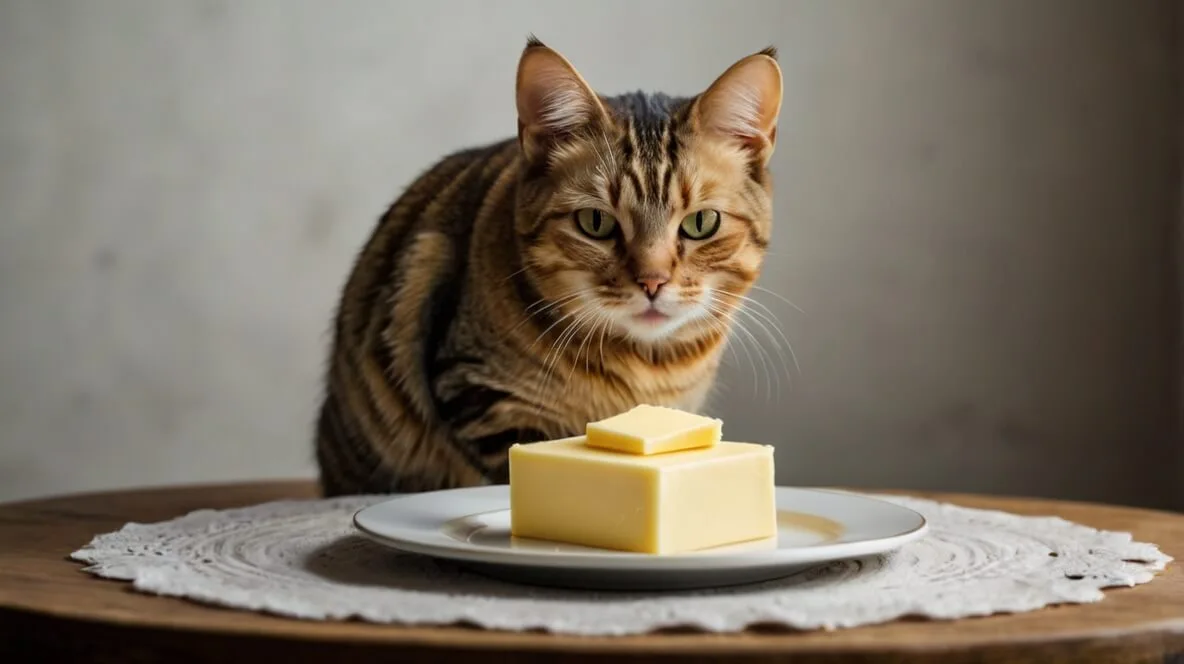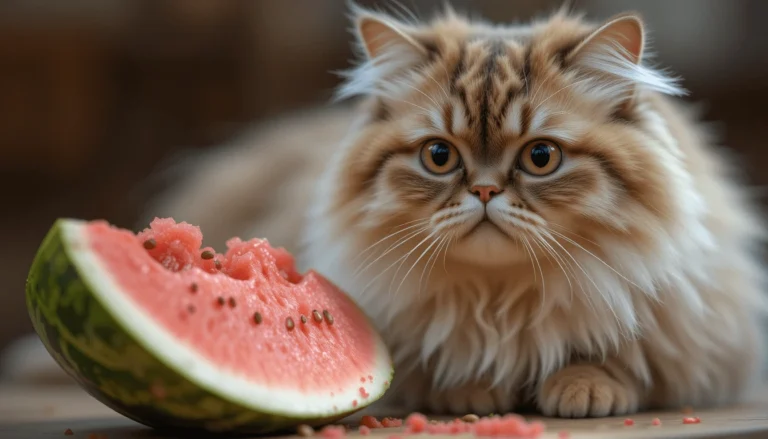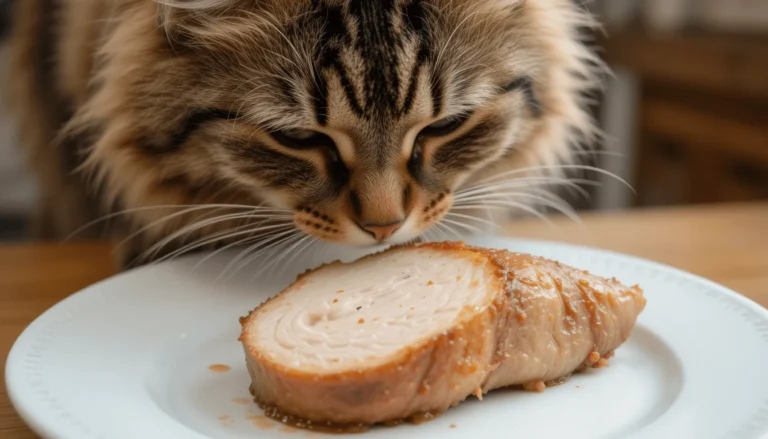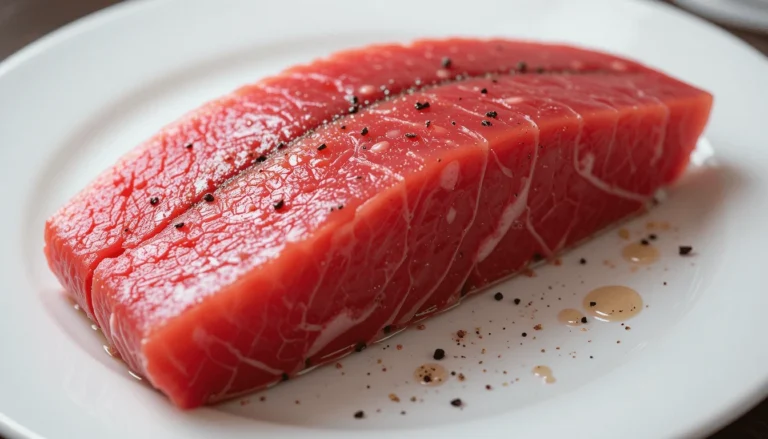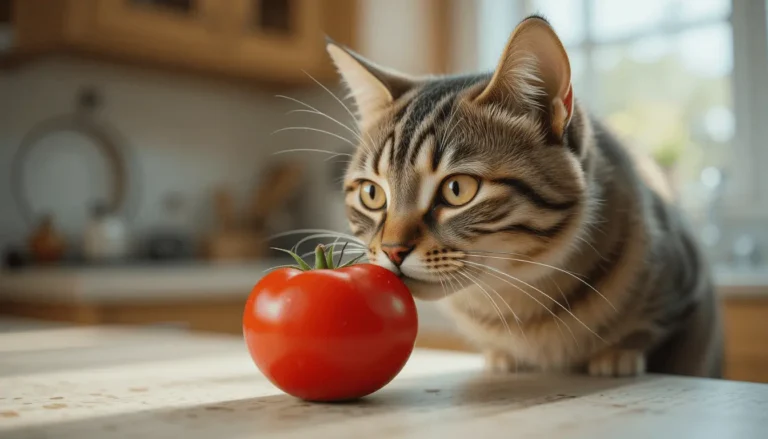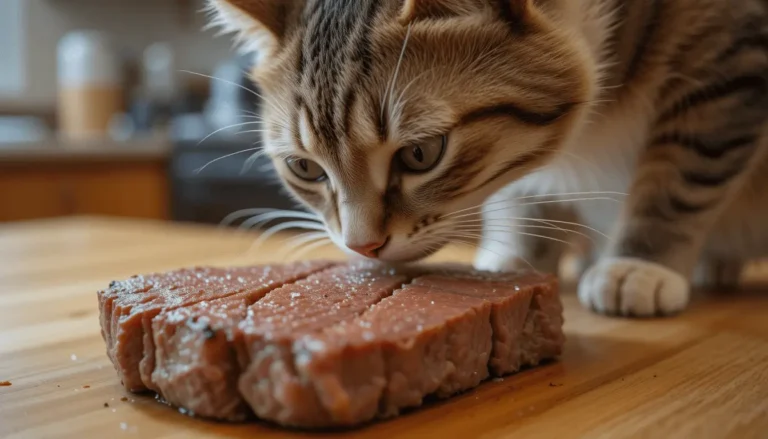Can Cats Eat Butter? Benefits, Risks & Safe Serving Tips
Introduction :
As a cat owner, you might wonder if cats can eat butter. This dairy product is often of interest to pet parents. However, it’s important to know the risks and health concerns it may pose. This article will explore the good and bad sides of butter for cats, helping you make better choices for their diet.
Butter might not harm cats, but its fat content can cause stomach problems like vomiting and diarrhea. Too much butter can even lead to pancreatitis, showing symptoms like belly pain, less appetite, and weight loss. So, it’s key to know how butter fits into your cat’s diet for their health.
Let’s dive into the world of cats and butter. We’ll share tips on safe serving and other treats to keep your pet happy and healthy.

Key Takeaways
- Butter is not toxic but can cause digestive problems in cats.
- High-fat content may lead to pancreatitis or other health risks.
- Flavored butters with onion or garlic are harmful to cats.
- Small amounts can be given occasionally but should not be a regular treat.
- Cats are often lactose intolerant, making butter a risky option for many.
- Healthy, cat-specific treats are recommended as a safer alternative.
Understanding the Attraction of Cats to Butter
Cats and butter have a special bond that fascinates many. This bond may come from cats’ history with butter. They often lived near farms, where they were exposed to dairy products. This led to their interest in butter.
Historical Context of Cats and Butter
Cats and butter have a long history together. Cats lived close to humans, especially farmers. They were often near dairy farms, where butter was made. This made them curious about butter.
The Science Behind Cats’ Attraction to Butter
Butter’s high fat content is a big reason cats like it. Cats need fats and proteins, which butter provides. They also have a great sense of smell, which helps them enjoy butter’s scent. Studies show cats prefer fatty tastes, which makes butter appealing to them.
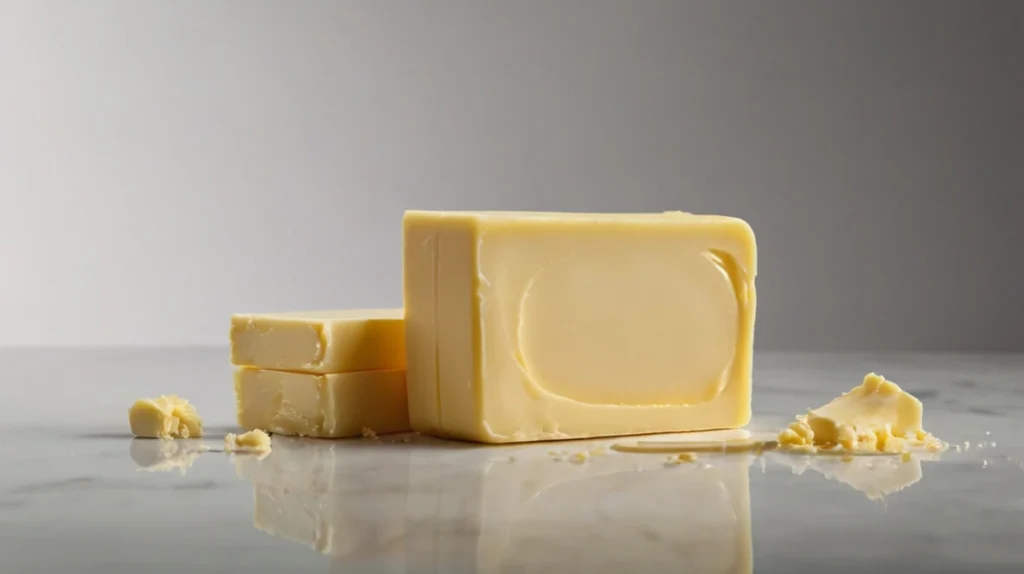
| Factor | Details |
|---|---|
| Historical Associations | Cats have lived alongside humans in agricultural settings, increasing exposure to dairy products. |
| Fat Content | Butter’s rich fat content aligns with cats’ dietary preferences as obligate carnivores. |
| Olfactory Sensitivity | Cats have a keen sense of smell, making them attracted to the unique aroma of butter. |
Can Cats Eat Butter? Exploring Health Implications
It’s important for cat owners to know about butter’s health effects. Butter is not poisonous to cats, but its high fat content is a concern. Each tablespoon has about 100 calories and 11.5 grams of fat.
This shows that while fats are good for cats, too much can harm their health.
Nutritional Content of Butter
Butter is mostly fat, with little protein and carbs. Fats are crucial for a cat’s energy, but they should be eaten in moderation. Too much butter can cause obesity and stomach problems.
Remember, a small amount of butter is okay, but eating it too often can upset your cat’s stomach.
Potential Health Risks of Butter for Cats
Too much butter can cause vomiting and diarrhea in cats. It may lead to inflammation of the pancreas, known as pancreatitis. Signs include stomach pain, less appetite, and weight loss.
Another big issue is lactose intolerance in adult cats. They can’t digest lactose well, leading to stomach problems. Even though butter has less lactose than other dairy, it can still be risky for cats with lactose intolerance.
Benefits of Introducing Butter into a Cat’s Diet
Adding butter to your cat’s diet can bring some interesting benefits. It’s important to know the nutritional perks before giving it to your cat. With the right approach, butter can be a good addition to their meals.
Possible Nutritional Advantages
Butter has omega-3 fatty acids that are good for your cat’s skin and coat. Eating it in small amounts can make their coat shine and skin feel better. It also adds calories, which is great for cats that need to gain weight.
Situations Where Butter May Be Beneficial
Butter is good for cats in certain situations. For example, it can help underweight cats gain weight. It’s also a tasty reward during training, but remember to use it sparingly to avoid stomach problems.
Safe Serving Tips for Cats Consuming Butter
When you think about giving butter to cats, safety is key. Butter is not harmful to cats, but it’s important to be careful. The fat in butter can cause stomach problems like vomiting and diarrhea. It’s vital to serve butter safely to keep your cat healthy.
Start with a tiny bit of butter to see how your cat reacts. Watch them for a few hours. If they have mild symptoms like vomiting or diarrhea, these usually go away in a day. But, if they have big problems or symptoms don’t get better, call your vet.
Always choose plain, unsalted butter without any extra ingredients. Flavored butters can have things like garlic and herbs that are bad for cats. Always check what’s in the butter to keep your cat safe.
In short, knowing if butter is safe for cats is good, but being careful and not giving too much is even better. Instead of butter, try giving your cat lean, cooked meats. These are safer and healthier treats for them.
| Tip | Description |
|---|---|
| Small Amounts | Begin with a tiny sample to assess tolerance. |
| Monitor Reactions | Watch for mild symptoms like vomiting or diarrhea. |
| Plain Butter Only | Use unsalted, unflavored butter without additives. |
| Check Ingredients | Avoid butters with garlic, herbs, or other toxic additives. |
Assessing Cats’ Digestive Systems and Butter Consumption
It’s important to understand how cats digest food, especially butter. Cats are mammals but can’t easily digest dairy because they lack lactase. This enzyme breaks down lactose in milk and butter.
How Cats Digest Dairy Products
Cats can’t digest dairy well as they get older. Kittens might be okay, but adult cats often struggle. This is why they might show signs of discomfort after eating butter.
Signs of Gastrointestinal Distress in Cats
Watch for signs if your cat eats butter. They might show:
- Vomiting
- Diarrhea
- Increased gas
- Abdominal discomfort
If your cat shows these signs, seek help right away. Choosing the right food for your cat can avoid these issues.
Expert Opinions: Veterinarians and Animal Behaviorists on Butter for Cats
Experts say to use butter in a cat’s diet with care. Veterinarians warn about the high fat content and possible digestive problems. Always consult your veterinarian before introducing new foods to your cat’s diet.
Watch how your cat reacts to butter. Every cat is different, so it’s important to notice their tolerance.
Veterinarian Perspectives on Butter Usage
Vets say some cats like butter, but it’s not always good for them. They suggest giving butter in small amounts if your cat wants it. This way, you can see if they have any bad reactions.
They often give this advice:
- Always talk to your vet before giving butter to your cat.
- Start with a tiny bit to see how your cat reacts.
- Think about how butter fits into your cat’s diet and calories.
Animal Behaviorist Insights on Treating Cats
Animal behaviorists focus on what each cat needs and likes. They say to watch your cat closely when giving treats like butter. Here are some important points from them:
- Use butter to play with your cat, but be careful of their reaction.
- Not all cats will like new foods, so be patient.
- Choose treats that fit your cat’s behavior and diet, for a balanced approach.
Alternatives to Butter for Feline Treats
Cats need a diet full of animal proteins and fats. This means we should look for healthier fats than butter. Butter has too much dairy and can upset a cat’s stomach. Luckily, there are many other options that are better for your cat’s health.
Healthier Fat Options for Cats
Fish oil supplements are a great choice instead of butter. They are full of omega-3 fatty acids. These fats help keep your cat’s skin and coat healthy and reduce inflammation. Always talk to a vet before adding any supplements to your cat’s diet.
Another good option is treats with essential fatty acids. Make sure the first ingredient is a high-quality animal protein. Stay away from treats with fillers or artificial additives to keep them nutritious.
Safe Cat-Friendly Treats and Substitutes
Choose snacks for your cat from high-quality meats like chicken or turkey. These treats are safe and can add variety to your cat’s diet. Remember, treats should not make up more than 10% of your cat’s daily calories.
Start with small amounts of new treats to watch for any bad reactions. Always check the ingredients to make sure they don’t have artificial colors, flavors, or preservatives. This way, you can give your cat treats that are both fun and healthy.
Conclusion
While cats can have butter sometimes, it’s important to keep it in moderation. Knowing the health risks is crucial. Butter might be tasty, but too much or the wrong type can be harmful.
Before adding butter to your cat’s diet, think about their health first. Consulting your vet is a wise choice. They can help make sure butter is good for your cat’s diet.
The real question is how to keep your cat healthy and happy. Remembering their nutritional needs is key. This helps you make the best choices for your pet.
FAQ
Can cats safely eat butter?
Yes, cats can have butter in small amounts. But, it’s key to know the health risks first.
Why are cats attracted to butter?
Cats love butter because it’s full of fat and smells good to them.
What nutritional content does butter contain?
Butter is packed with fat and calories, about 100 per tablespoon. It has little protein and carbs.
What health risks are associated with cats consuming butter?
Butter can lead to obesity, pancreatitis, and stomach problems. This is especially true for cats that can’t digest lactose well.
Are there any benefits to giving my cat butter?
A little butter can make a cat’s coat shiny and skin healthy. It also adds calories for skinny cats.
What are the best practices for serving butter to cats?
Give small amounts of plain, unsalted butter now and then. Watch for any bad reactions.
How do cats digest dairy products like butter?
Cats can’t digest lactose well as adults. This can cause stomach problems.
What symptoms indicate my cat may be having a reaction to butter?
Look out for vomiting, diarrhea, gas, or other stomach issues. Watch your cat closely.
What do veterinarians say about butter for cats?
Vets say to give butter in small amounts. They also suggest getting dietary advice tailored to your cat.
Are there healthier alternatives to butter for cats?
Yes, safer fats include fish oil supplements. There are also special cat treats with healthy fats.

